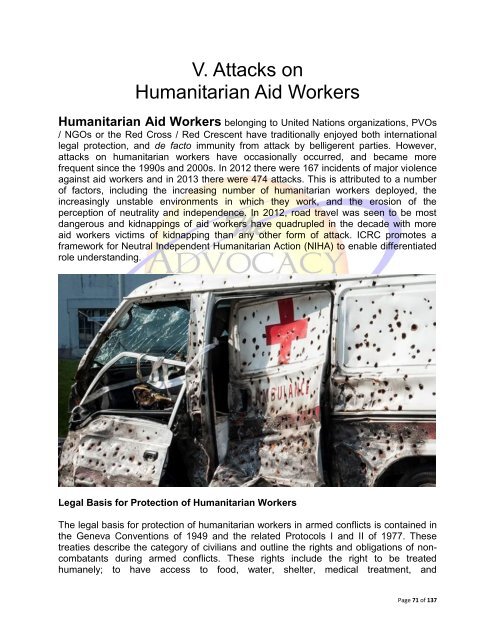The Theology of Missions
The Theology of Missions
The Theology of Missions
You also want an ePaper? Increase the reach of your titles
YUMPU automatically turns print PDFs into web optimized ePapers that Google loves.
V. Attacks on<br />
Humanitarian Aid Workers<br />
Humanitarian Aid Workers belonging to United Nations organizations, PVOs<br />
/ NGOs or the Red Cross / Red Crescent have traditionally enjoyed both international<br />
legal protection, and de facto immunity from attack by belligerent parties. However,<br />
attacks on humanitarian workers have occasionally occurred, and became more<br />
frequent since the 1990s and 2000s. In 2012 there were 167 incidents <strong>of</strong> major violence<br />
against aid workers and in 2013 there were 474 attacks. This is attributed to a number<br />
<strong>of</strong> factors, including the increasing number <strong>of</strong> humanitarian workers deployed, the<br />
increasingly unstable environments in which they work, and the erosion <strong>of</strong> the<br />
perception <strong>of</strong> neutrality and independence. In 2012, road travel was seen to be most<br />
dangerous and kidnappings <strong>of</strong> aid workers have quadrupled in the decade with more<br />
aid workers victims <strong>of</strong> kidnapping than any other form <strong>of</strong> attack. ICRC promotes a<br />
framework for Neutral Independent Humanitarian Action (NIHA) to enable differentiated<br />
role understanding.<br />
Legal Basis for Protection <strong>of</strong> Humanitarian Workers<br />
<strong>The</strong> legal basis for protection <strong>of</strong> humanitarian workers in armed conflicts is contained in<br />
the Geneva Conventions <strong>of</strong> 1949 and the related Protocols I and II <strong>of</strong> 1977. <strong>The</strong>se<br />
treaties describe the category <strong>of</strong> civilians and outline the rights and obligations <strong>of</strong> noncombatants<br />
during armed conflicts. <strong>The</strong>se rights include the right to be treated<br />
humanely; to have access to food, water, shelter, medical treatment, and<br />
Page 71 <strong>of</strong> 137

















